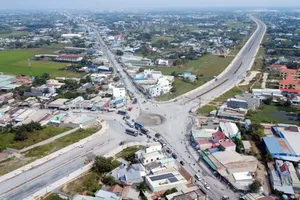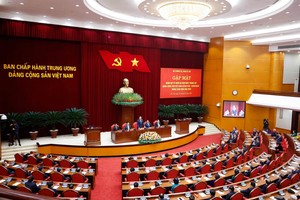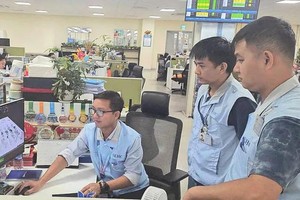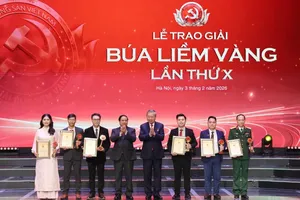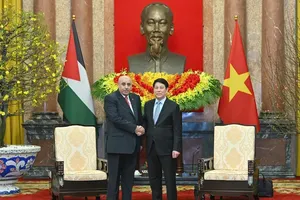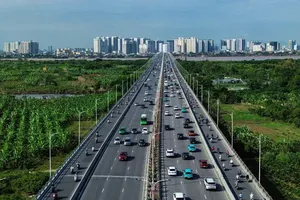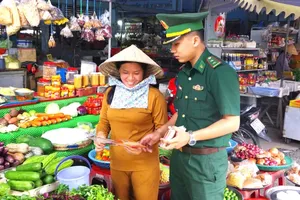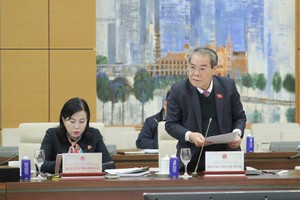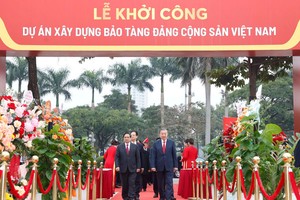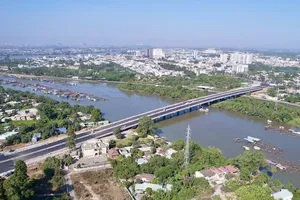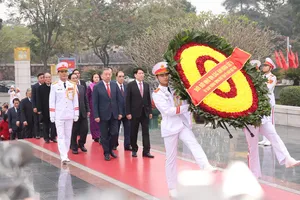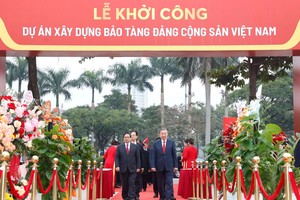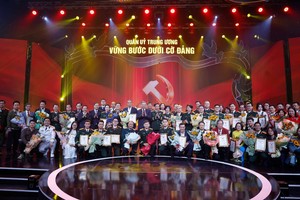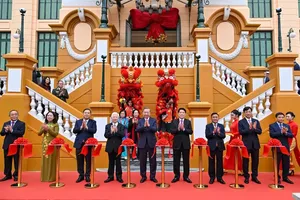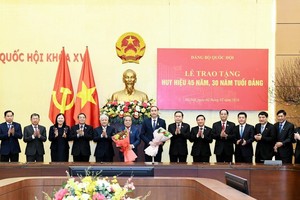The Party must continously renew and rectify itself, improve its leadership and ruling capabilities, and build a clean and strong Party to continue leading the nation on its path of development in the new era, realising the goal of prosperous people, a powerful nation, democracy, justice, and civilisation.
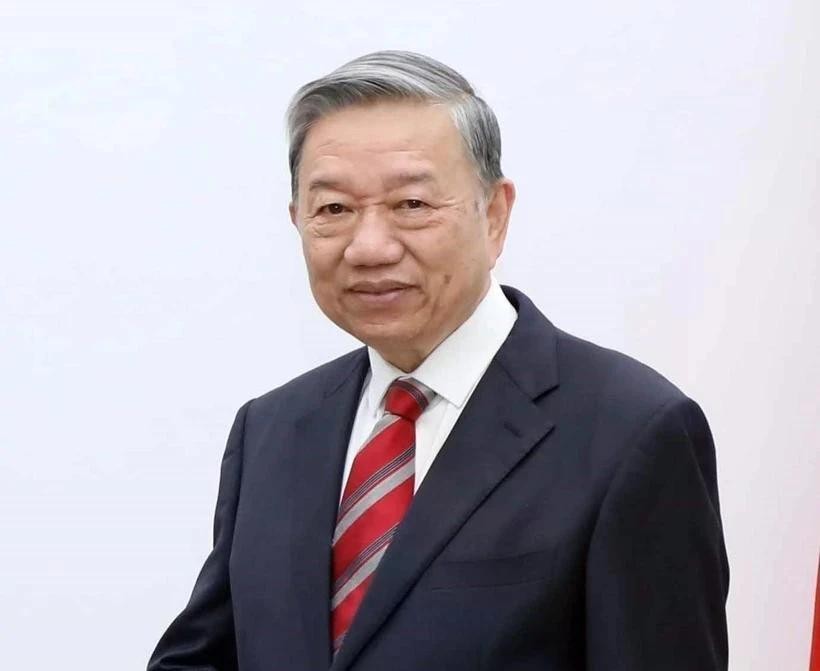
On the occasion of the 95th founding anniversary of the Communist Party of Vietnam (CPV) (February 3, 1930 – 2025), General Secretary of the CPV Central Committee To Lam has written an article titled “Rang ro Viet Nam” (Shining Vietnam).
The Vietnam News Agency (VNA) respectfully introduces a translation of the article.
A new spring has arrived, bringing joy and fresh vitality to every corner of the Fatherland. This spring is especially meaningful as the entire Party, people, and army are celebrating the 95th founding anniversary of the Communist Party of Vietnam (February 3, 1930 – 2025), a bright milestone marking the country's entry into a new phase of development towards a radiant future.
Over the past 95 years, our Party – the vanguard of the working class, the people, and the Vietnamese nation – has led the country through countless hardships and challenges to obtain great victories and achievements, leaving a lasting imprint on the nation's glorious history.
In 1930, the Communist Party of Vietnam was established in a particularly historical context, with a special mission. Since the mid-19th century, the French colonialists invaded our country and imposed a brutal domination regime, subjecting our people to slavery and misery. With a strong patriotic tradition and an unwavering spirit of resistance, our people rose up in continuous and powerful struggles using various methods and political movements - from the Can Vuong movement to the Yen The uprising, from the Dong Du and Dong Kinh Nghia Thuc movements to the Yen Bai uprising. Our people fought heroically, sacrificing much, but were ultimately unsuccessful due to the lack of a clear path, failure to unite and mobilise the strength of the entire nation, and the absence of an appropriate method of struggle, especially the lack of a leadership organisation or a political party capable of meeting the requirements of the nation and the era.
At the same time, in the world, the development of the workers’ movement and the victory of the October Revolution in Russia in 1917 opened up a new horizon, igniting hope for oppressed and exploited nations and strongly encouraging struggles for national independence across the continents.
In the face of historical requirements and with a burning desire for national liberation, young patriot Nguyen Tat Thanh set out in search of a way to save the country. He travelled across the continents, visiting nearly 30 countries and hundreds of cities, enduring immense hardships and challenges, and doing various jobs to survive and learn the wisdom of humankind. This journey allowed the young Vietnamese man to understand the roots of the suffering of the working people - the oppression and exploitation by the imperialist capitalism, helping him form a clear class consciousness. With the determination: Freedom for my compatriots, independence for my Fatherland, Nguyen Tat Thanh naturally approached Marxism-Leninism, as a historical necessity, and found in it the key issues for a national liberation strategy closely linked to class liberation and human liberation - national independence tied to socialism.
Facing historical requirements and under the guiding light of Marxism-Leninism, Nguyen Tat Thanh - Nguyen Ai Quoc engaged in numerous activities, rigorously preparing in terms of both thought, theory and human for the creation of a vanguard political organisation to lead the Vietnamese revolution. He spread Marxism-Leninism in Vietnam through works like “French Colonialism on Trial” (1925) and “Revolutionary Path” (1927), trained revolutionary cadres, and promoted the struggle movement at home.
On February 3, 1930, in Kowloon (Hong Kong, China), under the chair of Nguyen Ai Quoc, a conference was held to merge three communist organisations in Vietnam, leading to the founding of the Communist Party of Vietnam. This was a decision of historic importance, gathering the Vietnamese communist organisations into a single force with a clear, united revolutionary path.
The Party’s first political platform, adopted at its founding congress, defined the fundamental path for the Vietnamese revolution, meeting the urgent needs of history and becoming a rallying flag for uniting all communist organisations, revolutionary forces and the entire nation. This historic event ended the crisis in direction and organisation of the Vietnamese revolution and ushered in a new era in the history of our country - an era of struggle for national independence and advance to socialism.
Since its inception, with its correct policies, appropriate methods, creativity, practical organisational capacity, and the steadfast, self-sacrificing spirit of many generations of officials and Party members, along with the unwavering support, trust, and protection of the people, the Communist Party of Vietnam has led the country to great victories of historic and era significance.
In just 15 years after its founding, our Party grew rapidly, leading the national liberation struggle to the success of the August Revolution and the establishment of the Democratic Republic of Vietnam on September 2, 1945, abolishing the colonial and semi-feudal system in Vietnam and opening a new chapter in the nation’s history. The Vietnamese people, from being slaves, became masters of the country, society, and their lives.
Right after the success of the August Revolution, our country faced a myriad of difficulties and challenges, confronting the “famine, ignorance, and foreign invasion” all at once. In this critical situation, the Party led our people to bravely defend and build the fledgling government, while preparing on all fronts for the resistance war against French colonialism. With the right path and mobilising the strength of the entire nation, our Party successfully led the people to defeat every plot and invasion plan of the enemy during nine years of fierce and heroic resistance, culminating in the historic Dien Bien Phu Victory, forcing the French to sign the 1954 Geneva Accords for peace in Indochina.
For more than 20 years after that, our country was divided and peace was not yet achieved. Under the leadership of the Party and President Ho Chi Minh, with an unshakable will and determination, our people overcame countless hardships and sacrifices to carry out the great resistance war, successively defeating the US imperialists’ war strategies, completely liberating the South, and reunifying the country. This marked one of the most glorious chapters in our nation's history—an event of international stature and a profound sense of the era.
It was the realisation of the vision and determination put forward by our Party at the third Party Congress (September 1960): Our Vietnam is one, our Vietnamese nation is one. Our country will certainly be reunified on the basis of independence and democracy. Our people will surely reunite in peace, freedom, and happiness. Rivers may dry up, mountains may erode, but the will of the people to reunify the Fatherland will never waver, and in the end, we will undoubtedly achieve victory.
At a time when we had to urgently fix the heavy consequences left by the war, our country again faced new challenges. The Party continued to lead the entire army and people to strive to both restore the socio-economy and improve people's living standards, and resolutely defend every inch of sacred land of the homeland, and protect independence, sovereignty, territorial integrity, and the national survival space. At the same time, we also carried out our noble international duty toward the people of Cambodia.
In response to the new requirements of national development, in order to address the shortcomings of the bureaucratic, centralised planning system that led to a socio-economic crisis in the years after the war, and based on the practical lessons learned from the Party's leadership and direction, and the implementation of the entire political system and the people, our Party formulated and carried out a comprehensive Doi moi (renewal) policy, marking a significant turning point on the path of transition to socialism in Vietnam. The renewal policy was born to meet the practical demands of building the country's economy, national defence, security, and foreign relations, demonstrating the Party's steadfastness and creative mindset, and opening up a new era for the country's development.
After nearly 40 years of implementing the renewal process under the Party's leadership, our country has overcome all difficulties and achieved great milestones of historic significance. From being a poor, war-torn, sanctioned, and isolated country, Vietnam has now become a developing, middle-income nation that is deeply integrated into global politics, the world economy, and human civilisation. It now assumes many important international responsibilities, playing an active role in key international organisations and at multilateral forums. Independence, sovereignty, reunification, and territorial integrity have been upheld, and the national and people's interests have been ensured.
In 2024, the country's economy reached over US$470 billion, ranking 32nd globally and among the top 20 economies in terms of trade and foreign investment. The people's quality of life has improved significantly, with the poverty rate decreasing sharply to just 1.93 percent (based on multidimensional standards), from 60 percent in 1986.
Vietnam's political, economic, cultural, social, scientific, technological, defence, and security capabilities have seen continuous progress. The country's foreign relations have expanded, and its international position and prestige have grown, with active contributions to resolving regional and global issues. It has fulfilled many tasks as a member of ASEAN, the United Nations and other international organisations and institutions, earning the recognition and high evaluation by the international community.
The great achievements of the Vietnamese revolution over the past 95 years are attributed to many factors, of which the Party’s right and clear-sighted leadership is the top decisive factor, along with the sacrifices, fighting, and creative labour by the entire people and army under the Party's leadership, as well as the support and assistance from international friends.
In difficult and challenging times, the Party has clearly demonstrated its mettle and solidarity and stayed as a unified bloc in will and action, thereby leading and directing the entire political system to strive for great and comprehensive achievements in all fields.
At the same time, through the process of leading the revolution, the Party has been trained, becoming increasingly mature and strong, deserving its role and mission of leading the revolution as well as the people’s trust and expectations. That reality has affirmed that in Vietnam, there is no political force other than the CPV that has enough capacity, mettle, intelligence, experience and reputation to steer the country through all difficulties and challenges to lead the country’s revolution from one victory to another.
Looking back on the 95 years of the Communist Party of Vietnam’s construction, struggle, and growth, we express our countless gratitude and deep reverence to the great President Ho Chi Minh – the genius leader, the national liberation hero, who pioneered the revolutionary path and brought glory to our country and nation. We also respectfully remember the Party’s former leaders, the heroes and martyrs, the people and comrades who fought valiantly and selflessly sacrificed their lives in the glorious revolutionary cause for independence and freedom of the Fatherland, for socialism, and for the peaceful, happy, and prosperous life of the people.
The Party, State and people of Vietnam will forever remember the contributions by those who have rendered service to the country, families of martyrs, Heroic Vietnamese Mothers, Heroes of the Armed Forces, Labour Heroes, wounded and sick soldiers, the ones who were imprisoned in colonial and imperialist prisons, soldiers who fought on all fronts and fulfilled the noble international duties, war veterans and those who have worked hard and created material wealth for society.
The country is also always grateful to international comrades and friends who have constantly accompanied, supported and helped the Vietnamese people in the past struggles for national independence, and continued their cooperation and support for Vietnam’s national construction and development today.
Looking back on the Party’s glorious and pride-worthy history and tradition over the past 95 years, the responsibility of today's generation of leaders and Party members in the historical process of the nation becomes even clearer. The Party's current mission is to lead the country into an era of development and prosperity in which a socialist Vietnam with rich people, a strong nation, democracy, justice, and civilisation is successfully built, standing shoulder to shoulder with the powers across the five continents.
In that era, all people have a prosperous and happy life and are supported to develop and get rich while Vietnam contributes more and more to regional and global peace, stability, and development, for the happiness of humanity and global civilisation. The top priority is to successfully realise the strategic goals for 2030, when Vietnam will become a developing country with modern industry and upper-middle income; and for 2045, when it will be a developed socialist country with high income.
To continue shouldering that historical responsibility, the Party must grow stronger, maintain its revolutionary essence, and enhance its leadership and ruling capabilities, combat strength, and close ties with the people. The Party must continously reform and rectify itself, promote internal democracy, build a contingent of strong and clean cadres who are steadfast to the objectives and ideals of Marxist-Leninist and Ho Chi Minh's ideology.
Simultaneously, the Party must work tirelessly to perfect its theoretical foundation and improve ideological work quality, creating a solid foundation for leading the country towards rapid and sustainable development. Given the revolution's new requirements, especially in the context of deep international integration and global challenges, the Party building work needs more attention, innovation, and drastic implementation, focusing on these key areas:
First, continuing to firmly adhere to the Party's goals and ideals. The Party was established with the mission of leading the revolution and representing the interests of the working class, the working people, and the entire Vietnamese nation. From the early days of the struggle for independence to becoming the ruling party, the CPV has consistently pursued the goals of national liberation, building socialism, and bringing prosperity and happiness to the people.
The Party exists not for its own interests but for the people's interests. The Party's leadership power is not inherent, but is delegated by the people. The Party has no other goal than to struggle for the interests of the people, the country, and the nation. President Ho Chi Minh emphasised: The Party is not an organisation for making officials rich. It must fulfill its mission of national liberation, making the country powerful and the people happy.
Therefore, the Party must always remain closely connected with the people, seeing the interests of the people as its highest goal, while maintaining its revolutionary nature and its vanguard role. In the current context, the Party must remain steadfast in its ideological foundation, continue to creatively apply Marxism-Leninism and Ho Chi Minh’s thought into reality, and firmly protect the path towards socialism.
At the same time, the Party must continously renew and rectify itself, improve its leadership and ruling capabilities, and build a clean and strong Party to continue leading the nation on its path of development in the new era, realising the goal of prosperous people, a powerful nation, democracy, justice, and civilisation.
Second, continuously improving the Party's theoretical system. A solid theoretical foundation guides the Party's actions and determines the correctness of leadership directions and national development strategies. Over the past 95 years of leading the revolution, the Party has drawn many lessons and gradually developed theoretical thinking about the path to socialism, the socialist-oriented market economy model, building a socialist rule-of-law state, national defence, security, foreign relations, and many other important areas.
Perfecting the theoretical foundation is urgent for the Party to continue leading the country amid today's profound global changes across all aspects of life. However, the process of development always presents new challenges, requiring the Party to continuously assess practice, refine, and advance theory.
The practice review process must face the truth, accurately evaluate achieved results, and objectively point out limitations, weaknesses, shortcomings, and their causes. It needs to clearly identify the bottlenecks hindering national development, thereby proposing breakthrough solutions to create strong momentum for future development. Research work must also clarify the major opportunities that should be seized, the significant challenges that must be overcome, and the new factors in practice that need to be incorporated.
Frankness, objectivity, scientific approach, honesty, steadfastness, and prudence are necessary to avoid mistakes and subjectivism. These issues need to be clarified during the preparation of documents for the 14th National Party Congress. This is not just the work of the Party’s specialised agencies but requires the participation of the entire political system, intellectuals, theoretical research institutions, each cadre and Party member, and people nationwide.
Third, continuing to build and rectify the Party, making it clean and strong. This is a task of decisive importance for the Party's existence and development. It is necessary to consolidate solidarity and unity within the Party, enhance leadership capacity and combat strength of each Party organisation, while building clean and strong Party organisations at grassroots levels which serve as the core of the political system and maintain close ties with the people.
Meanwhile, Party inspection, supervision, and discipline must be strengthened, promoting self-criticism and criticism, resolutely punishing officials and Party members who show degradation in political ideology, moral virtue and lifestyle and manifestations of “self-evolution” and “self-transformation”. It is necessary to enhance the effectiveness and efficiency of inspection and supervision work to maintain discipline and order within the Party.
The fight against corruption, negative phenomena, and wastefulness needs to be implemented drastically, comprehensively, and systematically, without forbidden zones or exceptions, creating deterrence and contributing to purifying the apparatus and strengthening people's trust in the Party.
Officials and Party members, especially leaders of Party committees at all levels, must raise the responsibility for setting an example, always listen to the people's opinions, and promptly address the legitimate public aspirations to create social consensus. Simultaneously, it is crucial to promote the role of public oversight over officials and Party members, ensuring the Party remains a leadership force loyal to national interests and dedicated to the people's happiness.
Fourth, it requires a strong determination to streamline the organisational apparatus of the political system, making it more streamlined, effective and efficient, and dealing with cumbersomeness and overlaps. The recent Party congresses’ documents have consistently emphasised specific tasks related to streamlining the political system or researching the development of a comprehensive model for the political system's organisational structure in the new period. The Party has also continuously issued several Resolutions and Conclusions to lead the reform and reorganisation of the political system.
However, the awareness and actions of some Party committees and organisations, leadership teams, and heads of certain agencies, organisations, units, and localities have been insufficient, lacking depth and high determination, as well as decisive actions. The apparatus organisation has been inconsistent and lacking a comprehensive approach, with no clear linkage between personnel streamlining and restructuring.
As a result, the organisational apparatus of the political system remains cumbersome and its effectiveness and efficiency do not meet requirements and tasks. The functions, tasks, power, organisation, and working relationships among many agencies and units are not yet clear, with overlaps and redundancies. The delineation of responsibility, decentralisation, and delegation of powers is not harmonious and reasonable, and in some cases, there is shirking of responsibility, while in others, there is negligence or insufficient investment.
Compared to tremendous changes in the country over the last four decades of reform, the development of the socialist rule-of-law State, and achievements in science and technology, the organisational apparatus of the political system is still largely based on a model designed tens of years ago. Many issues are no longer suitable for new conditions and go against the principles of development, leading to a situation where 'words do not match actions.'
Therefore, the key task in the current phase and the near future is to build and implement a comprehensive model for organising the political system in Vietnam, in order to meet requirements and tasks of the new revolutionary period.
Fifth, building the contingent of cadres, especially key officials at all levels. In response to the growing demand for development and integration, the contingent of cadres, especially key officials at all level, must meet essential standards such such having strong political mettle, pure ethics, a high sense of responsibility; being truly exemplary, honest, dedicated to serving the people with no personal gain, corruption, or other negative practices; having innovative and creative thinking, the ability to seize opportunities, thinking big, acting bold, and daring to take responsibility for the sake of the common good; not avoiding or being passive in the face of emerging issues; possessing practical abilities, leadership, and management skills.
To that end, a strong reform in mindset regarding personnel work is needed. Personnel processes must become a mechanism for selecting the best and most qualified individuals, not a mean to legitimise the selection, appointment, or promotion of individuals who fail to meet standards, and those who are not truly exemplary, or do not serve the people.
In addition to ensuring transparency in appointment and rotation processes and strengthening inspections and monitoring, mechanisms for identifying, protecting, and promoting talented individuals should be established. Clear accountability measures must also be in place, where those who introduce, appoint, or promote individuals who do not meet standards, lack integrity, or are incompetent must be held accountable. At the same time, there must be a firm stance against nepotism, cronyism, and group interests in personnel planning and appointments.
Sixth, promoting science – technology application and digital transformation in the Party building. Advances in information technology, artificial intelligence, big data, and digital transformation are having a profound impact on all aspects of social life. Applying scientific and technological achievements to Party building is not only an urgent requirement but also a breakthrough step to improve the Party's leadership and raise its combat capacity in the new context.
Information technology and artificial intelligence will contribute to modernising the management of Party members and the operation of Party organisations. The development of a digital-based Party member management system will help improve transparency, accuracy, and efficiency in managing records and work processes, and evaluating Party members. This allows all-level Party committees to accurately assess their staffs and implement reasonable training, development, and rotation mechanisms, addressing the issues of bureaucracy and lack of practical experience.
Digital technology will also contribute to increasing the effectiveness of political and ideological education and popularisation. Digital platforms and social networks can be used to quickly, vividly, and effectively promote the Party's policies and directions among Party members, officials, and the people. New technologies also help improve the ability to detect emerging issues early, give analysis and forecast, and propose appropriate solutions. Digital technology provides accurate and objective data, enabling Party committees to make sound decisions based on scientific analysis rather than intuition.
Seventh, an urgent key task of all-level Party committees, as well as each Party cell and Party member in 2025 is to concentrate their efforts and intelligence to, together with the people, complete and exceed the targets set in resolutions of Party committees at all levels, with special attention to socio-economic development targets; the organisation of Party congresses at all levels towards the 14th National Party Congress, focusing on contributing opinions to the Party’s documents; introducing and selecting truly exemplary persons who work for the sake of the country and the people, to participate in the political system at all levels; and creating a truly democratic, united, enthusiastic atmosphere in working, production, and national construction and development among people from all walks of life.
Looking back on the 95 years of the Party's development, the Vietnamese people have the right to be proud of and have complete confidence in the bright future of the Party and the nation. In 1945, when leading the entire people to the successful August Revolution, the Party had only nearly 5,000 members, but with its sound guidelines, steadfast spirit, indomitable will and patriotism, it led the people to the glorious victory, establishing the Democratic Republic of Vietnam.
In 1960, when the country entered the protracted resistance war against the US, the Party membership increased to about 500,000, becoming the nucleus guiding the entire nation to fight for national independence and reunification. Today, with more than 5.4 million Party members, the force has been growing unceasingly in both quantity and quality, capable of shouldering the responsibility of leading the country forward in the new era.
Each Party member is a symbol of the faith, intellect, and solidarity of the entire nation. The CPV, under the light of Marxism-Leninism and Ho Chi Minh ideology, will continue to excellently fulfill its historic mission. With confidence in the strength of the Party and the solidarity of the entire nation, it could be affirmed that the entire Party, people and army will unite to surmount all difficulties and challenges, securing fast and sustainable development for the country in the new era as well as a glorious and bright future for the Vietnamese people.
